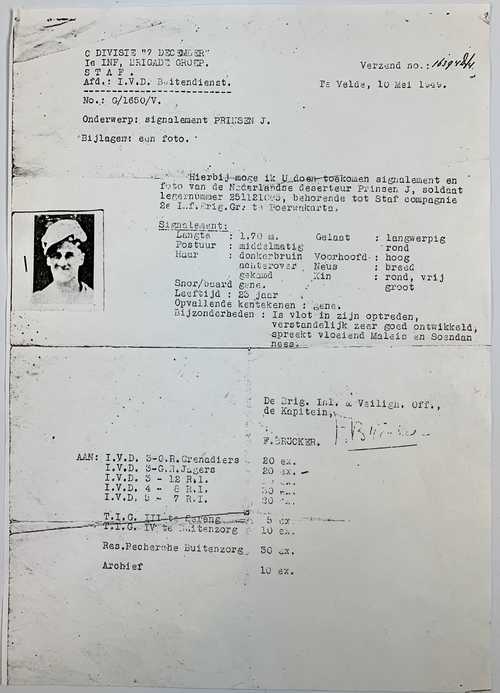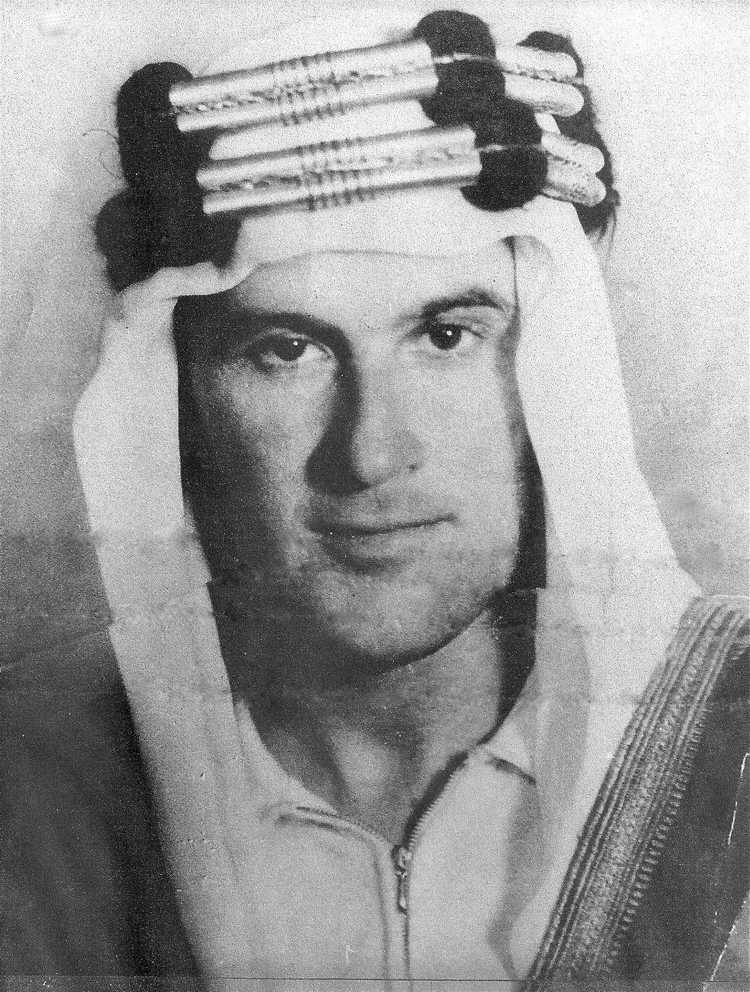The original and Dutch version of the above article can be found here. This English translation was made with the help of Bas de Groot (Flinders University Australia).
Youth
Jan is born in Den Haag, and grows up in a liberal Catholic family with socialist political sympathies. During his youth, the Princen family often stays with Jan’s grandparents in the city of Oss. His grandmother Trees (Theresia van der Lee) plays a very influential role in his life, and it is during these stays that Jan is introduced to the rich Roman Catholic and regional culture of the province of Brabant. Because of his experiences, his interest in Catholic religion grew and Jan expresses the wish to become a missionary priest. Despite second thoughts on the part of his parents, he enrols in the seminary at Weert in 1939. Soon afterwards his younger brother, Kees Princen (1927-2017), follows in his footsteps, enrolling in the same seminary.
German occupation
Jan does not finish his education to become a priest. According to his own words, this is because of “his interest in women”. After the start of World War II and the occupation of the Netherlands by German forces, Princen wants, as a young man looking for adventure and excitement, to join the Allied forces. In 1943 he attempts to reach England but is arrested during his attempt. He is convicted and sent to prison. He is first detained in the concentration camp of Vught, then transported to the Kriegswehrmachtgevängnis (German Wehrmacht prison) in Utrecht, from there to transit camp Amersfoort, and ended up in a German prison in Bocholt. During his stay in prison, Jan takes inspiration from the novel Leven en daden van Pastoor Poncke van Damme in Vlaanderen (‘Life and actions of Pastor Pocke van Damme in Flanders’) (1941) by Jan Eekhout (1900-1978). He regularly quotes and recites from the novel to his fellow inmates. It was here that he get his nickname ‘Poncke’, which he cherishes for the rest of his life. Princen is imprisoned until May 1945.
To Indonesia
When the Allied forces liberate Princen in 1945, he immediately joins the Allies by signing up as a war volunteer in the Dutch armed forces. He enlists in the Brabantse Stoottroepen (‘Brabant Shock troops’) in the southern provinces of the Netherlands, but leaves military service in December 1945, when the war is well and truly over. Shortly afterwards, like thousands of other young Dutchmen, he receives a notification that he is to be conscripted into the new post-war Dutch Army. Seeing no reason for himself to serve in the military, he refuses to report for duty, and flees to France. During his flight he is arrested and taken to Schoonhoven to the ‘Depot Nazending Indië’ (a depot for conscripts that did not report for duty and who are to be sent to Indonesia). Many of the conscientious objectors are in this same camp. This is where Jan meets Piet van Staveren (1925), a communist and political opponent of the Dutch recolonisation of Indonesia. Piet van Staveren will prove to have an important influence on Jan’s life and actions. On 28 December 1946 Princen, along with the other refractory conscripts, is put on the troop transport ship Sloterdijk on his way to Indonesia. Meanwhile, his brother, Kees Princen, has left the seminary in Weert to join the Dutch Royal Marines and fight in the Indonesian war.
Desertion
Upon his arrival in Indonesia Jan Princen is formally charged with trying to evade conscription. On 22 October 1947 he is sentenced to twelve months’ imprisonment, of which four months were unconditional, and detained in punishment camp Tjisaroea, West-Java. While detained, he hears about the defection of his political friend Piet van Staveren, Van Staveren has deserted from the Dutch army and joined the Indonesian forces.
After Princen serves his time, he re-joins the Dutch army as a Corporal at the 1st Advanced Dressing Station Unit (‘Hulpverbandplaatsafdeling’) of the 7 December Division. During a number of military actions that he witnesses his conviction grows that “the violence of the Dutch troops against the local population was not justified.”
Warrant for the arrest of Jan ‘Poncke’ Princen. This deserter was “clever in his appearance and actions, mentally well-developed, speaks Malayan and Sundanese fluently.” (Photo: 1949, collection Museum Bronbeek)
In action with the enemy
On 25 September 1948 Princen goes on leave to Soekaboemi, but instead of seeking rest and relaxation, he deserts. Inspired by Van Staveren, Poncke crosses the demarcation line - the de facto border between the area held by Dutch forces and the area held by Indonesian Republican forces - and enters Djogjakarta via Semarang. Djogja is the capital city of the Republic and the political and military heart of the Indonesian revolution. Initially, the Republicans arrest him and consider him to be a prisoner of war. During the Second Police Action by the Dutch forces, which starts on 19 December 1948, he is released.
Princen then formally joins the Republican Army. He returns to the front in West Java with the Siliwanggi division, and while there he falls in love with an Indonesian woman named Odah. Under Commander Kemal Idris (1923-2010) he is given command of his own combat group called Pasukan Istimewa. Poncke is militarily active in the ambushing and shelling of Dutch troops. The goal of his combat group is mainly to capture weapons.
Major-General E. Engles (KNIL, 1895-1959) is under pressure to solve the problem of a Dutch soldier leading Republican forces, and with obvious disgust towards this deserter he instructs Dutch forces to "eliminate Corporal Princen". On 9 August 1949, Dutch troops under the leadership of Lieutenant Ulrici (Corps of Special Forces, 1921-2005) kill Poncke's wife Odah and twelve Indonesian fellow fighters. Yet Poncke Princen, the target of the action, manages to escape. A day later the armistice is signed, after which the formal transfer of Indonesian sovereignty is signed on 27 December 1949.
Life and work in Indonesia
Princen is decorated by the first Indonesian president Soekarno (1901-1970) for his military efforts. He is furthermore made an Indonesian citizen and remains with the Indonesian National Army (TNI). In 1956 he is elected as a member of parliament. However because of his opinions and views, which are critical of the Soekarno Government and which he airs freely and often, he is arrested and put in prison during 1957 and 1958, and again from 1962 to 1966. In 1966, Princen becomes president of an Indonesian human rights institute and in the 1970s he co-founds a legal aid organization in Indonesia. Due to his activities, which do not coincide with the government’s aims, he again ends up in jail.
These forced periods of separation costs Poncke his second relationship, with the Indonesian woman named Heda. He then marries the Dutch Janneke Marckmann (1930) with whom he has children. However, despite his previous jail sentences, Princen continues to regularly face the government over human rights issues and continues to strive for democratic reforms. His continued activism at the expense of his family life also proves to be too much for Janneke, and after a few years she leaves Poncke and returns to the Netherlands.
In 1992 Princen receives an international human rights prize for his work. He plays a special role in the struggle for the liberation of East Timor. He supports the East Timorese pursuit of self-determination, and becomes friends with the Timorese freedom fighter and later president Xanana Gusmão (1946). In 1998, Princen sits in a wheelchair on the front row of a number of barricades, in protest against the military dictatorship of president Suharto (1921-2008). These protests, mainly led by students and intellectuals, ultimately lead to the fall of the president, followed by a number of hoped-for democratic reforms in Indonesia.
"We nemen hem te grazen (We’ll still get him)"
Meanwhile in the Netherlands, many ‘Indië-veteranen’ and right-wing politicians still find it inexcusable that Princen had taken up arms against his own countrymen. Many see him primarily as a traitor to his country. But in 1993 writer and ‘Indië-veteraan’ Ger Vaders (1925-2005) finally overcomes his repulsion of Princen’s actions. He travels together with Poncke through Indonesia, visiting numerous battlefields of the War of Independence and in the same year writes the book De Verliezers (‘The Losers’).
In 1994, on humanitarian grounds, and on condition that he "behaves unobtrusively", the Minister of Foreign Affairs, minister Van Mierlo, provides Princen with a visa to travel to the Netherlands, where Poncke's third wife Janneke lives with three of his children. The visit is opposed by many members of the Association of Old Soldiers that served in Indonesia (VOMI). Lieutenant B.D. Ulrici, the officer once sent out to assassinate Princen, declares that he will still shoot Princen when he sets foot in the Netherlands. Overall, however, Princen’s visit to his birth country comes off without any incidents.
Near the end of his life Princen suffers several strokes, and contracts skin cancer. Until the end of his life in February 2002, he remains optimistic and industrious. "I always keep in mind that I have defended a number of values that are typically Dutch: honesty, a strong love of freedom for all, and respect for other people’s opinions. I will always keep fighting for that. "
Princen dies at the age of 76 in Jakarta and is buried in the cemetery of Pondok Kelapa.
The original and Dutch version of the above article can be found here. This English translation was done with the help of Bas de Groot (Flinders University Australia).
Bronnen
Wolffers, I en Bloem, M., Wij komen als vrienden, VPRO 1984.
Nijpels, B. Poncke Princen. Held of landverrader, Sting like a bee (KRO) 2009.
Princen, H. en Fenema, J. van, Een kwestie van kiezen, Den Haag, 1995.
Vaders, G. en Jong, de S. (red.), De verliezers: Indonesië op het tweede gezicht, Amsterdam, 1993.
Bals, K. en Gerritsen, M., De Indonesië-weigeraars, Amsterdam, 1989.
Hulst, W., 'De lotgevallen van Poncke Princen, deel 3; De wraak van Het KNIL. De lotgevallen van Poncke Princen', NRC, 28 september 1991.
Dagboek Poncke Princen en andere stukken (ARCH02152), Archief Internationaal Instituut voor Sociale Geschiedenis (IISG).
